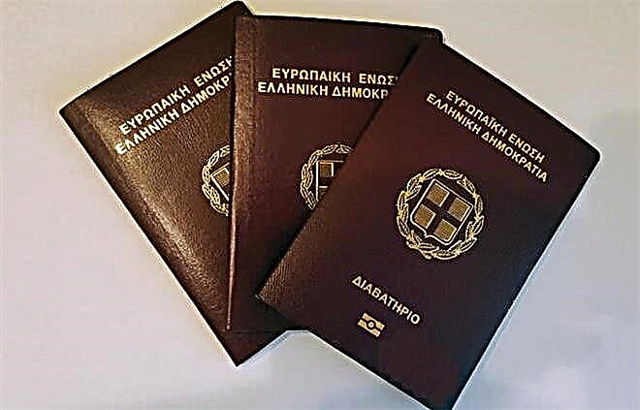Since 1981, Greece has been a full member of the EU, therefore Greek citizenship is attractive for many immigrants from the CIS countries, including as a channel for entering the European Union. Greek migration legislation has undergone significant changes for a long time. As a result, in 2004, a unified Law “On Citizenship” was adopted, which defines the conditions for obtaining a Greek indigenous person. Below we will figure out why a Greek passport is attractive, what are the reasons for obtaining it and in what order it is issued.

Pros of Greek Citizenship
A Greek passport is also an EU passport. Its presence opens up broad opportunities for immigrants both in terms of freedom of movement and in terms of other guaranteed civil rights and freedoms.
Citizenship is the political and legal relationship between a citizen and the state, expressed in the mutual rights and obligations of the indicated parties. With this in mind, a Greek passport guarantees its holder:
- free movement, residence, employment, business, education and other activities in any of the EU countries;
- visa-free travel to 174 countries of the world - in 2021, according to the Henley & Partners rating, a Greek passport is included in the top 6 passports of the world in terms of freedom of movement;
- the right to work in government structures in Greece and in municipal services;
- the right to free education in all educational institutions of the country;
- the right to participate in elections both as a candidate and as a voter;
- the right to retain the existing citizenship.
At the same time, before obtaining Greek citizenship, a citizen of the Russian Federation must also learn about the obligations under the country's constitution:
- contributing to the defense of Greece;
- participation in public duties;
- compliance with national legislation;
- respect for national and cultural values, environmental protection;
- observance of the rights and freedoms of other citizens.
Grounds for obtaining citizenship
A complete list of grounds for becoming a citizen of Greece is defined by the Code of Greek Citizenship (ΚΩΔΙΚΑΣ ΤΗΣ ΕΛΛΗΝΙΚΗΣ ΙΘΑΓΕΝΕΙΑΣ), ratified by law no. 3284/2004.
The specified document defines 5 grounds for the acquisition of a Greek indigenous, including:
- On the basis of birth (Articles 1, 1a, 1b of the Code). A child born of Greek parents or born in the territory of Greece is recognized as a Greek, unless he otherwise acquires another citizenship or his parents or their citizenship are unknown. But Greek citizenship by blood is not the only option for children; children of foreigners who have lived in Greece for 5 years, who entered the 1st grade of a Greek school, also have the right to it. In addition to them, the right to citizenship arises for foreigners who have completed 6 or 9 grades of education at school or received education at a Greek university, provided they permanently reside in the country.
- In connection with the recognition (Art. 2 of the Code). A child of a Greek born out of wedlock, but recognized, for example, as a result of establishing paternity, is recognized as a citizen.
- In connection with adoption (Article 3 of the Code). A minor adopted by Greek citizens is recognized as a citizen from the moment of adoption.
- In connection with service in the Armed Forces (Article 4 of the Code). Another option for a Russian to obtain Greek citizenship is to enter a military school in accordance with the law as a volunteer. From the moment of admission to the school, cadets automatically become citizens.
- By naturalization (Articles 5, 5a, 5b of the Code). The most common basis for obtaining Greek citizenship for foreigners. To obtain a passport in this manner, the Greek Citizenship Law requires a foreigner to:
- reach the age of majority;
- have no convictions related to imprisonment;
- not be banned from entering Greece and not be expelled;
- legally reside in Greece for 7 years (3 years for EU citizens) on the basis of a residence permit, refugee status or other legal basis;
- know the Greek language;
- be integrated into the social and economic life of the country (ranging from the availability of housing, property and tax deductions to knowledge of Greek history and culture);
- have the opportunity to participate in the political life of the country;
- not create threats to national security.
 A separate reason for obtaining Greek citizenship for an ethnic Greek is the naturalization of expatriates living outside the republic, including in the countries of the former Soviet Union (Article 15 of the Code).
A separate reason for obtaining Greek citizenship for an ethnic Greek is the naturalization of expatriates living outside the republic, including in the countries of the former Soviet Union (Article 15 of the Code).
Conditions include a clean criminal record and proof of Greek descent with a birth certificate or baptismal certificate. The application for Greek citizenship upon repatriation is submitted through the country's diplomatic mission abroad.
Buying a Greek passport - reality or fraud
Greek legislation does not provide for such a basis for obtaining an indigenate as for acquiring it on a reimbursable basis. In practice, many intermediary organizations can offer a candidate for official status to buy Greek citizenship, for example by forging documents of origin.
However, if the falsification is subsequently revealed, the person will lose both the Greek passport and the money spent on the fraudsters. We strongly discourage readers from using these options for obtaining citizenship.
Stages of obtaining citizenship
As a general rule, Greek citizenship by naturalization is granted only on the condition that the foreigner resides in the country legally, including on the basis of one of the residence permits. Therefore, the first stage of naturalization will be to obtain a residence permit.
Residence permit
A residence permit in Greece is a document allowing temporary residence in the country. The grounds for obtaining it may, for example, be:
- making investments;
- employment and other professional activities;
- study, volunteer work, scientific research;
- marriage and family reunification;
- carrying out independent economic activities;
- purchase of real estate and registration of the "Golden Visa";
- refugee status, illegal return of migrants and other reasons.
A residence permit is issued by the department of decentralized administration or the Ministry of Internal Affairs for a period not exceeding 2 years.
If the grounds for residence in Greece persist, the residence permit is extended for up to three years.
An application for an extension must be submitted 2 months before the expiration of the residence permit, otherwise the owner will be fined 50 euros.
Permanent residence
In most cases, after 5 years of residence with a temporary residence permit, a foreigner can be granted permanent permanent residence in Greece. The right to it arises if a foreigner:
- can attest to having a steady income and independence from social assistance;
- has full health insurance against illnesses, which also applies to his family members;
- complies with the conditions for integration into Greek society established by clause 2 of article 90 of law 4521/2014.
Having lived with permanent residence for another 2 years, a foreigner has the right to apply for citizenship.
Package of documents for citizenship
 In general cases, foreigners wishing to obtain citizenship must submit to the Greek Ministry of Internal Affairs:
In general cases, foreigners wishing to obtain citizenship must submit to the Greek Ministry of Internal Affairs:
- valid passport;
- valid residence permit / permanent residence;
- a receipt for payment of the state duty;
- application for naturalization (drawn up in the presence of the mayor of the municipality of permanent residence of the applicant and two witnesses);
- birth certificate;
- color photo;
- a copy of the income statement for the last year;
- social security registration number;
- marriage certificate (for those who are in it);
- a copy or printed photo of the Greek passport of the Greek parent;
- police clearance certificate from foreign authorities;
- other documents depending on the situation.
We recommend that you familiarize yourself with the complete set of a specific package of documents depending on your situation on the website of the Ministry of Immigration Policy of Greece.
After studying the case, the foreigner is invited to an interview with the Naturalization Committee. There he confirms his knowledge of the Greek language and provides other information that is necessary for naturalization.
Cost and terms of registration
An administrative fee is charged for the consideration of an application in the amount of:
- € 700: for third-country nationals upon first request;
- € 200: for third country nationals upon re-submission;
- € 100: for foreigners, citizens of EU member states, refugees, stateless persons.
The law does not establish the maximum duration of consideration of an application. The decision on naturalization is published in a government newspaper, after which the foreigner must take an oath within a year. If he does not do this, the decision is canceled.
Why can they refuse
The Ministry of Internal Affairs has the right to send a refusal to an applicant for citizenship if the conditions for naturalization were not met or other violations were identified, for example:
- fictitious marriage, on the basis of which a residence permit was obtained;
- submission of forged, forged, fictitious or containing false information documents;
- outstanding conviction;
- fact of service in foreign military forces;
- failure to pass an interview with the Naturalization Committee;
- creating a threat to the security of Greece;
- disappearance of grounds for granting refugee status.
In any case, the Ministry of Internal Affairs is not obliged to explain the reasons for the refusal. If a foreigner considers the decision to be unlawful, he has the right to appeal against it in an administrative procedure. Otherwise, he will be able to reapply for citizenship only after a year.
Bipatrism in Greece
The immigration legislation of Greece does not put forward as one of the conditions for obtaining citizenship, the renunciation of an indigenous person held by a foreigner. This means that the second citizenship in Greece is not prohibited, and therefore the foreigner will be able to retain the existing citizenship and get a new one - this will not entail any consequences for him.
However, by both Russia and Greece, such a bipatride will be considered exclusively its own citizen. There is no special regulatory or contractual framework between the countries, and therefore Russia-Greece dual citizenship is impossible.
Russian life in Greece
 There are a lot of Russian emigrants in Greece. Of course, the country is not one of the areas of mass immigration from the Russian Federation.
There are a lot of Russian emigrants in Greece. Of course, the country is not one of the areas of mass immigration from the Russian Federation.
Those migrants who live here are conventionally divided into two categories: those who came to work and those who live for family reasons. Of course, if you do not take into account the ethnic Greeks.
As in other countries, Russians in Greece are mainly concentrated in large cities: Athens, Thessaloniki, Patras.
The peak of the crisis has passed, but despite this, large cities are the only opportunity for immigrants from the CIS to find a normal job. Most of them are employed in tourism and construction.
The Russian-speaking community is showing itself very energetically. Among the most active organizations are the cultural and educational society "Berezka" and the Russian Center for Science and Culture in Greece. They not only hold mass events, but also help establish contacts with compatriots.
There are no Russian schools in Greece, the only one is at the Russian Embassy, and it is paid. The attitude of the local population is generally benevolent: both the European origin of Russians and the common Orthodox faith are reflected.
Conclusion
Greek citizenship is very attractive for Russians, and in large part because of the access to the European labor market and the right to free movement / residence.
Local migration legislation provides 5 grounds for acquiring citizenship, and the main one is naturalization. For her, it is necessary to live in Greece on the basis of a residence permit / permanent residence for at least 7 years, to prove social integration and law-abidingness.
There is a large fee of 700 euros to apply for citizenship. A nice bonus is the ability to retain Russian citizenship, you don't need to give it up.











